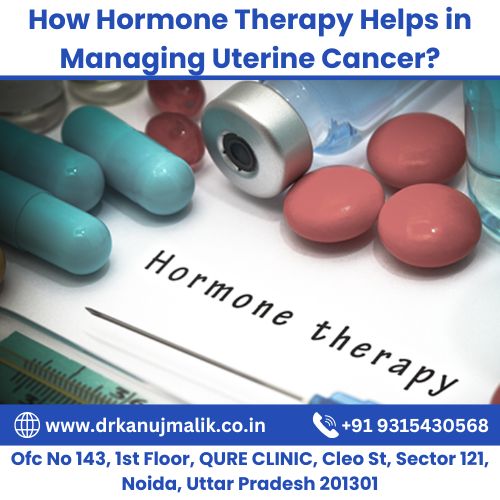Uterine cancer, a common type of cancer affecting the lining of the uterus, is most frequently diagnosed in postmenopausal women. While the treatment options for uterine cancer include surgery, radiation therapy, chemotherapy, and hormone therapy, hormone therapy plays a significant role, especially in hormone-sensitive cases.
This blog will discuss how hormone therapy works in managing uterine cancer and highlight the role of Dr. Kanuj Malik, a leading uterus cancer specialist in Noida, in offering expert care to patients.

What is Hormone Therapy?
Hormone therapy for uterine cancer involves the use of hormones or hormone-blocking medications to slow or stop the growth of cancer cells that are influenced by hormones.
Oestrogen, in particular, can stimulate the growth of certain uterine cancer cells. Hormone therapy works by either blocking the action of estrogen or reducing its levels in the body.
The primary forms of hormone therapy used for uterine cancer are:
- Estrogen-blocking agents: These drugs block oestrogen from attaching to its receptors on cancer cells, thus slowing down the cancer’s growth. Tamoxifen and aromatase inhibitors are some common medications used in this category.
- Progestin therapy: Progestins are synthetic forms of progesterone, a hormone that counteracts the effects of oestrogen. Progestin therapy can shrink or stabilize some forms of uterine cancer by preventing oestrogen from stimulating cancer cell growth.
Hormone therapy is particularly useful for treating cancers that are oestrogen receptor-positive (ER-positive) or progesterone receptor-positive (PR-positive), meaning that the cancer cells rely on these hormones for their growth.
How Hormone Therapy Works in Uterine Cancer?
Hormone therapy works by either reducing oestrogen levels or blocking oestrogen’s action, both of which can help manage the progression of uterine cancer. Uterine cancers that are sensitive to oestrogen can grow rapidly when exposed to high levels of oestrogen. By using hormone therapy, doctors can limit this effect and help control the cancer.
Here’s how hormone therapy helps in managing uterine cancer:
- Slowing Cancer Growth: In many uterine cancers, oestrogen is a key driver of growth. Hormone therapy, which blocks oestrogen’s action or lowers its levels, can slow or even stop the growth of oestrogen-dependent cancer cells.
- Reducing Recurrence: After the surgical removal of a uterine tumour, hormone therapy can help reduce the likelihood of cancer returning. This is particularly important in hormone-sensitive cancers, where oestrogen can encourage the growth of any remaining cancer cells.
- Managing Advanced Uterine Cancer: For patients with advanced or metastatic uterine cancer, hormone therapy can help control the disease and manage symptoms. It may be used in combination with other treatments like chemotherapy or radiation when surgery is not an option or when cancer has spread beyond the uterus.
- Preserving Fertility: In certain cases, hormone therapy may allow younger women with uterine cancer to avoid a hysterectomy, enabling them to preserve fertility. Progestin therapy can sometimes shrink or stabilize tumours without requiring the removal of the uterus, allowing women to explore future pregnancy options.
Benefits of Hormone Therapy for Uterine Cancer
Hormone therapy provides several benefits for patients with uterine cancer, especially when compared to traditional treatments like chemotherapy. Some of the key benefits include:
- Targeted Treatment: Hormone therapy specifically targets cancer cells, particularly those influenced by oestrogen, while causing minimal damage to surrounding healthy tissue. This makes it a more focused approach than chemotherapy.
- Fewer Side Effects: Unlike chemotherapy, which can cause severe side effects such as nausea, fatigue, and hair loss, hormone therapy generally causes fewer side effects. Patients typically experience less discomfort and a better quality of life during treatment.
- Non-invasive: Hormone therapy is often administered as a pill or injection, making it less invasive than surgery or radiation. This can be a significant advantage for patients who are not candidates for surgery or want to avoid invasive treatments.
- Long-Term Control: For women with oestrogen receptor-positive uterine cancer, hormone therapy can provide long-term disease control and reduce the risk of recurrence. In many cases, it can stabilize the disease, helping patients manage their cancer for an extended period.
Dr. Kanuj Malik: Uterus Cancer Specialist in Noida
Dr. Kanuj Malik is a renowned uterus cancer specialist in Noida, with over 14 years of experience in surgical oncology. He specializes in managing uterine cancer and offers personalized treatment plans that may include hormone therapy, surgery, and radiation.
His expertise in hormone therapy allows him to effectively treat hormone-sensitive uterine cancer, helping patients manage the disease while minimizing side effects.
Dr. Malik is committed to providing the best possible care, ensuring that each patient receives a treatment plan tailored to their specific needs. His focus on early detection and comprehensive care plays a crucial role in improving outcomes for uterine cancer patients.
Conclusion
Hormone therapy is a vital treatment option for managing uterine cancer, especially in cases where the cancer is hormone-sensitive. By reducing the effects of oestrogen, hormone therapy can slow the growth of cancer cells, reduce the risk of recurrence, and improve overall prognosis.
With fewer side effects than traditional treatments like chemotherapy, hormone therapy can significantly enhance a patient’s quality of life during treatment.
For expert care in managing uterine cancer, Dr. Kanuj Malik, a leading uterus cancer specialist in Noida, offers comprehensive treatment options that can help patients achieve the best possible outcomes.
If you or a loved one is dealing with uterine cancer, consulting Dr. Kanuj Malik can provide access to the latest treatments and expert guidance on managing the disease.
Qure Clinic
Address – Shop No 143 1st floor, Cleo Street, near CLEO COUNTY, Sector 121, Noida, Uttar Pradesh, 201301
Email –kanujmalik03@rediff.com
Phone – +91 9315430568
Monday To Saturday – 9:00AM–9:00PM
Sunday closed
Google Map Location Listing – https://g.co/kgs/BfrTkmW
